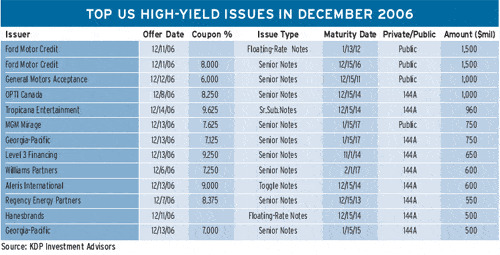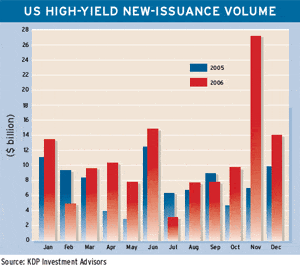Corporate Debt
Although the US credit markets performed well in 2006, with tight spreads of corporate bonds to US treasury securities, analysts say persistent underlying inflation and a potential weakening in the dollar threaten to cause spreads to widen this year, particularly for high-yield debt.

In this case, we would expect sustained credit underperformance due to increased downgrades and defaults and a turn in the credit cycle, the report says. The firms economists say that they expect the Fed to begin raising interest rates around mid-year.
Barclays Capital says the second threat to credit markets is that an unwinding of the carry trade, driven by rising global interest rates, particularly in Japan, along with continued dollar weakness could reduce foreign demand for both US treasuries and corporate bonds, causing US interest rates to rise. The carry trade involves borrowing in a low interest-rate currency, such as the Japanese yen, and investing the proceeds in a higher-yielding instrument in another currency such as the dollar.
While earnings should remain strong this year for US investment-grade corporations, which have strong enough balance sheets to absorb any deterioration in credit quality, lesser-rated credits could suffer, according to Barclays Capital. We are more concerned about the prospects for credit quality in high yield, which has not seen the same degree of balance-sheet improvement, the firms analysts say.
Leveraged buyouts, or LBOs, and other corporate transformations are the major fundamental risk to investment-grade credit ratings this year, the report says.
Leveraged buyouts are the most extreme form of expropriation of value from bondholders to shareholders, where losses by bondholders have contributed 20% of the gains experienced by equity holders in LBOs, the report says.

Barclays Capital says strong liquidity and healthy corporate balance sheets most likely will keep credit spreads tight in 2007, despite the risks of a Fed tightening or lessened foreign demand for US debt securities. The firm is estimating that US investment-grade debt issuance in 2007 will decline by 10% to 15% from 2006.
According to economists at Citigroup, US policymakers will take great comfort from the dip in 12-month core inflation, which excludes volatile food and energy prices, from 2.8% to 2.6% in November 2006. In the three months through November, the core consumer price index was increasing at an annual rate of 1.6%.
These data are a direct challenge to the view that underlying inflation will prove stubbornly high in the absence of unambiguously tight monetary policy, Citigroup says. With consumer resistance to rising prices as strong as ever, the latest cyclical burst of inflation may have run its course, the banks economists say. There is little for the Fed to do but stand back and watch, they say.
Gordon Platt



